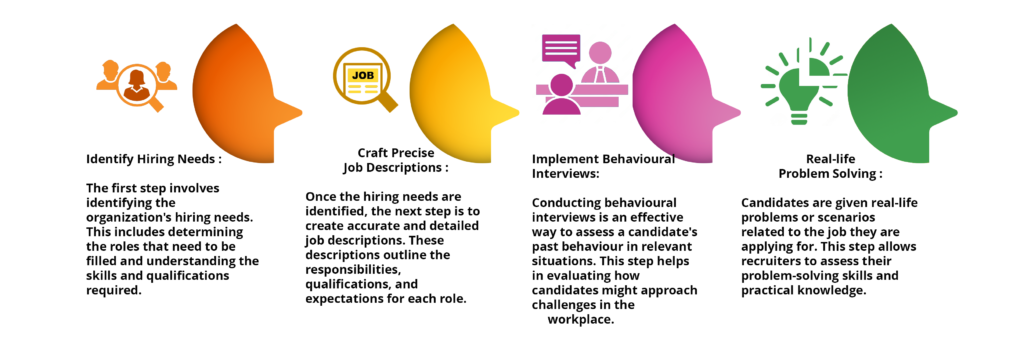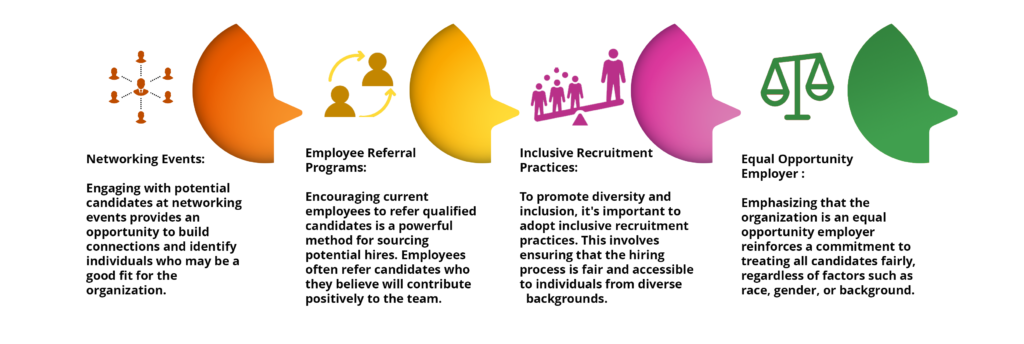Starting a career in finance or scouting for exceptional talent to strengthen your financial institution? Your search ends here! This extensive guide takes a deep dive into the guesswork out of Finance Recruitment in Ireland, providing valuable insights and expert perspectives. Whether you’re a budding finance professional eager to navigate the industry landscape or a financial institution looking to build a formidable team, this guide is your go-to resource for all things related to finance recruitment in the vibrant setting of Ireland.
Within this article, we aim to provide not only a roadmap for navigating the intricacies of finance recruitment but also a holistic understanding of the Irish financial sector. Delve into the latest trends, best practices, and insider tips that will empower you to make informed decisions, whether you are a prospective job seeker or a discerning recruiter.
Whether you’re perusing this guide for career insights or seeking to elevate your institution with top-notch professionals, rest assured that you are equipped with the knowledge to navigate the fascinating world of finance recruitment Ireland.
Finance Recruitment Ireland: A Strategic Overview
Discovering Opportunities in Ireland’s Finance Hub
Ireland, a thriving hub for finance professionals. It’s not just a location; it’s a buzzing centre where finance careers are taking off. Whether you’re considering a career in finance or looking to recruit top talent, this guide will be your key to navigating the landscape.
Navigating the Changing Tides: Trends in Finance Hiring
In the competitive world of finance jobs, staying ahead is crucial. We’ll guide you through the emerging trends shaping the finance job market in Ireland. From the rise of Fintech to the enduring appeal of traditional banking, understand how these trends influence the strategies behind finance recruitment.
Cracking the Code: Academic Qualifications in Ireland’s Finance Sector
Ever wondered about the importance of academic qualifications in Ireland’s finance sector? This section has the answers. Uncover the significance of certifications and degrees that stand out in the eyes of employers. Whether you’re a job seeker aiming to boost your qualifications or a recruiter looking for the best candidates, this part of the guide has got you covered.
Navigating the Job Market: Tips for Job Seekers
Mastering the CV Game: Crafting a Standout Finance CV
Your CV is like a golden ticket in the world of job hunting. Let’s learn how to make it shine! This section is all about creating a finance CV that stands out to recruiters in Ireland. We’ll cover the tricks and tips to make sure your CV gets noticed and opens doors to exciting opportunities.
Creating a standout finance CV is like painting a vivid portrait of your professional journey. It’s not just a list of past jobs; it’s a story that showcases your skills, experiences, and potential. Begin with a concise yet impactful personal statement, introducing yourself and highlighting what makes you unique. Dive into the details of your education, highlighting relevant qualifications. When delving into your work history, focus on achievements and responsibilities that demonstrate your financial prowess.
Numbers and tangible outcomes can speak volumes. Don’t forget to include any additional skills, such as proficiency in financial software or languages. Tailor your CV for the specific finance role you’re aiming for, aligning your experiences with the job requirements. In the competitive landscape of finance, a standout CV is your golden ticket, capturing the attention of recruiters and setting you on the path to career success.
Building Bridges: Effective Networking in Ireland’s Finance Scene
In today’s super-connected world, building a network is like having a secret weapon. We’re going to chat about smart strategies to grow a strong professional network specifically tailored for Ireland’s finance industry. Whether you’re just starting out or looking to expand your connections, these tips will help you build bridges.
Networking in the dynamic space of finance is a key strategy for professional success. Begin by attending industry events, seminars, and conferences to connect with like-minded individuals. Engage in conversations, ask questions, and actively listen to others in order to build meaningful relationships. Leverage online platforms like LinkedIn to expand your professional network, sharing insights and connecting with professionals in the finance sector.
Regularly update your profile to reflect your skills and experiences. Consider joining finance-related groups or forums to participate in discussions and stay abreast of industry trends. Remember, networking is a two-way street; be willing to offer assistance and share your knowledge with others. Building a robust professional network in the finance industry not only opens doors to potential opportunities but also enhances your understanding of the field, positioning you for long-term success.
Nailing the Interview: What Employers Really Want

Interviews can be a bit nerve-wracking, right? Don’t worry, we’ve got the inside scoop on what employers are looking for in the Irish financial landscape. From the right attitude to the key skills, we’ll help you understand the nuances of interviews so you can ace your finance job interview.
So, whether you’re polishing up your CV, expanding your network, or gearing up for an interview, these tips are your roadmap to success in the world of finance jobs in Ireland. Let’s make your journey into the job market a smooth and successful one!
Navigating a finance job interview requires a strategic approach to showcase your skills and make a lasting impression. Begin by thoroughly researching the company and understanding its financial landscape. Tailor your responses to demonstrate how your skills align with the specific needs of the role. When discussing your experiences, focus on quantifiable achievements, illustrating the impact of your contributions. Be prepared to discuss your understanding of financial markets, regulations, and industry trends.
Showcase your problem-solving abilities and adaptability, emphasising instances where you’ve successfully tackled financial challenges. Additionally, be ready to discuss your motivation for pursuing a career in finance and your long-term goals.
Finally, demonstrate your enthusiasm for continuous learning and staying updated on industry developments. By combining thorough preparation with a confident and personable approach, you’ll enhance your chances of making a positive impression during your finance job interview.
Finance Recruitment Ireland: A Closer Look
Diversity and Inclusion in Finance
Diversity and inclusion in the field of finance are paramount for fostering a vibrant and innovative industry. Embracing diversity means recognising and valuing the unique perspectives, backgrounds, and experiences that individuals bring to the table. In the finance sector, a diverse workforce can lead to a more comprehensive understanding of markets and clients, ultimately driving better decision-making. It’s not just about representation but creating an inclusive environment where everyone feels heard and respected.
Organisations in finance benefit from a mix of talents, skills, and viewpoints, enhancing creativity and problem-solving. Initiatives promoting diversity and inclusion, such as mentorship programmes and inclusive hiring practices, play a crucial role in creating a level playing field. Emphasising these values in finance not only strengthens the industry’s social fabric but also contributes to building more resilient and adaptive financial systems in an ever-changing global landscape.
Remote Work Dynamics
The dynamics of remote work in the finance sector have undergone a significant transformation, reflecting the broader evolution of work structures. Remote work in finance brings forth both challenges and opportunities. On one hand, technology has facilitated seamless collaboration, enabling financial professionals to work from diverse locations. This flexibility has opened doors to a more diverse talent pool and allowed for a better work-life balance.
On the other hand, remote work has prompted financial institutions to adapt to new cybersecurity challenges and implement robust digital infrastructure to ensure the secure handling of sensitive financial data. The virtual nature of work has also necessitated a shift in communication strategies, with video conferencing and online collaboration tools becoming integral to daily operations.
Striking the right balance between flexibility and maintaining the security and efficiency required in finance is key. As the financial industry continues to navigate these dynamics, the future of remote work in finance promises a blend of adaptability, innovation, and a redefined work culture.
Finance Recruitment Ireland: FAQs
What qualifications stand out in the finance job market in Ireland?
In Ireland, qualifications such as ACCA, CFA, and a degree in finance are highly valued by employers. These certifications enhance your credibility in the competitive job market.
Are cover letters essential in finance job applications?
Absolutely. A well-crafted cover letter provides an opportunity to showcase your personality and express your genuine interest in the position. It’s a valuable tool to set yourself apart.
How can I build a strong professional network in Ireland’s finance industry?
Attend industry events, join professional networking platforms, and connect with professionals on LinkedIn. Engage in meaningful conversations to establish lasting connections.
What’s the significance of cultural fit in finance recruitment?
Cultural fit is paramount in Ireland’s finance sector. Companies seek candidates who align with their values and work culture, fostering a positive and productive environment.
Is remote work common in the Irish finance industry?
Yes, remote work has become increasingly prevalent. Many finance companies in Ireland offer flexible work arrangements, reflecting the evolving nature of work post-pandemic.
What role does technology play in finance recruitment?
Technology plays a significant role, with AI-driven recruitment tools and platforms streamlining the hiring process. Job seekers should stay updated on the latest tech trends in the industry.
Conclusion:
The multifaceted landscape of finance in Ireland encapsulates a journey marked by continual adaptation, evolution, and resilience. From navigating the intricacies of finance recruitment in the heart of Europe to mastering the art of CV crafting and networking, individuals entering this dynamic sector are armed with insights to thrive.
As the industry embraces diversity and inclusion, acknowledging the strength in varied perspectives, and grapples with the tones of remote work dynamics, it becomes evident that the finance sector is not only about numbers and transactions but also about people, innovation, and adaptability.
The future of finance in Ireland lies in the hands of those who dare to explore its depths, armed with knowledge, a commitment to inclusion, and a readiness to navigate the changing currents of the financial landscape. Whether embarking on a finance career or steering a financial institution, the journey is one of continuous learning, growth, and a shared commitment to shaping a resilient and inclusive financial future.
Martina Quinn Finance Recruitment specialises in the placement of qualified accountants up to executive level nationwide, Our teams have extensive experience (67 years combined) recruiting in the Irish Market. Reach out to the team here at Martina Quinn Finance Recruitment for the best advice and support in building your finance teams contact us today.





















